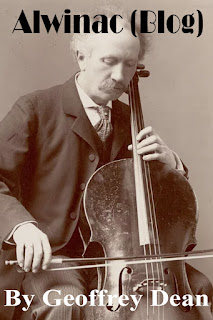 |
| [Click on image to go directly to the Alwinac’s home page] |
A central feature of Italian opera through the 19th century, the bel canto singing style also influenced cellists of the Italian school such as Piatti, C. A. Casella, and Braga, all born in the 1820s. But “Beautiful singing” was more than just an approach to singing or playing: bel canto also referred to the kind of music intended to be performed in the bel canto singing style, including the many fantasies with variations on famous opera arias by Rossini, Donizetti, Bellini, and Verdi that these and other Romantic-era cellists were fond of composing and performing.
A more unusual example in the bel canto cello repertoire is the “Preludio” of Verdi’s early opera I Masnadieri – unusual because it is a self-contained piece (i.e., it can be played independently) and it is not a cellist's a paraphrase of existing vocal music. In the summer of 1847, when I Masnadieri (The Robbers) was premiered in London, commentators questioned why Verdi had not provided a more bombastic orchestral overture and thought that the prelude, seemingly unrelated to the rest of the opera, was too insubstantial to serve in its place. It certainly showcased the talent of Alfredo Piatti, the new first cellist of Her Majesty’s Theatre, and there was general agreement that his playing of the prelude was a highlight of the opera’s premiere. It can also be argued that giving the lone cello centerstage IS related to the subject of the opera as whole, because it brings out the idea of isolation so central to The Robbers, a tragic story driven by student-turned-robber Carlo’s estrangement from his family and fiancé, and culminating in his calamitous choice of fidelity to the robber band over his love for Amalia. The isolation idea has important implications for interpreting the cello solo – is its character one of unalloyed melancholy, or is there a stronger vein of personal rebellion running through it
_______________
Read on….
| Copyright © 2021 by Geoffrey Dean |

No comments:
Post a Comment